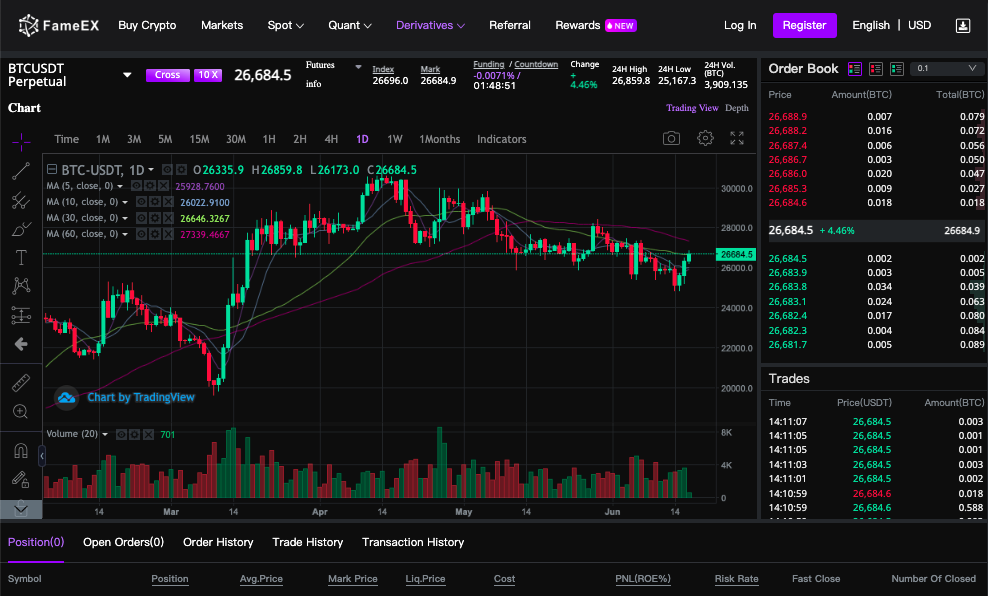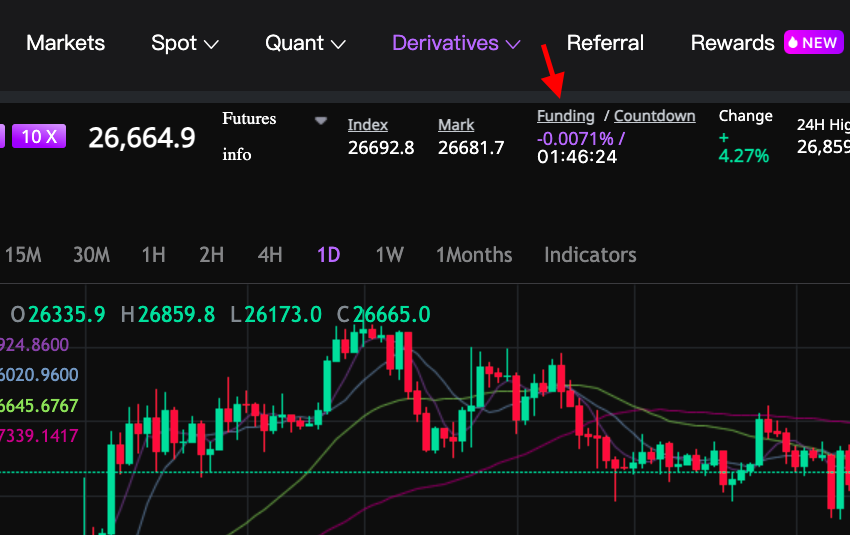Perpetual Futures vs. Standard Futures Contracts in Crypto Trading
2023-06-20 07:11:30The world of cryptocurrency trading continues to advance, offering an extensive range of financial instruments and derivatives to traders. One of the newer instruments, perpetual contracts, presents both unique advantages and risks that differ from traditional futures contracts. In this article, we will delve into the crucial differences between these two contracts in the context of crypto trading. We'll inspect the potential benefits and risks of each contract type and share strategies for successfully trading perpetual contracts. With this knowledge, you'll equip yourself with a comprehensive understanding of how these two financial instruments diverge and which one is best suited to your trading objectives.
Differences between Perpetual Contracts and Traditional Futures Contracts in Crypto
When it comes to the world of cryptocurrency trading, there are different options to choose from, such as perpetual contracts and traditional futures contracts. Let's take a closer look at the differences between them:
Contract Duration
The primary difference between perpetual contracts and traditional futures contracts is the duration of the contract. Traditional futures contracts have a set expiration date, while perpetual contracts do not. In other words, traditional futures contracts have an end date where the trade will be settled, whereas perpetual contracts can be held indefinitely without an end date.
This difference in duration can impact how traders approach each contract type. With a traditional futures contract, traders may need to make decisions based on upcoming expiration dates or rollover periods. Alternatively, with a perpetual contract, traders can hold positions for longer periods without worrying about expiration dates. FameEX provides perpetual futures contracts that allow traders to engage in futures trading without the concern of expiration dates.

FameEX perpetual futures contracts
Funding Rates
Another major difference between these two types of contracts is their funding rates structure. Perpetual contracts have funding rates that are paid by traders who hold positions over time while Traditional Futures Contracts do not require any funding rate payments. The funding rate for the settlement is between longs and shorts. When the funding fee rate is positive, longs pays shorts. When it's negative, shorts pays longs.

Funding rates of perpetual futures contracts
The funding rates for Perpetual Contracts are used to ensure that there is no significant deviation in price between the underlying asset and its index price when holding long or short positions over time and maintain fair trading conditions for all market participants.
Liquidation Mechanism
The liquidation mechanism in both types of trading differs as well. Traditional Futures Contract has fixed liquidation prices while Perpetual Contract uses Dynamic Liquidation prices that follow real-time market conditions.
In simpler terms this means that if a trader's margin balance drops below maintenance margin level then instead of getting completely liquidated at a predetermined price point, traders positions are closed at a price that is as close to their Bankruptcy Price as possible. This can work both in favor of and against the trader.
Therefore, traders need to approach each contract type with a different mindset based on the liquidation mechanism involved.

Benefits of Perpetual Contracts over Traditional Futures Contracts
Trading in perpetual contracts offers several benefits over traditional futures contracts. In the following sections, we will discuss some of these advantages:
1. No Expiration Date
One of the primary benefits of perpetual contracts is that they do not have an expiration date like traditional futures contracts. In a fixed-term futures contract, traders are bound by a specific time frame to close their positions or roll them over to the next contract. On the other hand, perpetual contracts operate indefinitely without any set expiration date.
This indefinite operation provides traders with greater flexibility and allows them to hold positions for as long as they want without worrying about any fixed timeline. Unlike futures contracts, traders can hold their positions for days, weeks, months or even years without being forced to close them out.
2. High Leverage
Perpetual contracts also offer higher leverage compared to traditional futures contracts - up to 100x in some cases. Higher leverage means that traders can open larger positions with smaller amounts of capital. However, FameEX only allows up to 30X leverage for futures trading, an approach designed to protect users from potentially catastrophic losses.
This advantage appeals particularly to small-time investors who do not have large amounts of capital but are looking for opportunities to make significant profits from their trades.
3. Funding Rates
Funding rates are another significant advantage that perpetual contracts have over traditional futures trading. In perpetual contract trading, funding rates maintain price stability on the platform and provide incentives for traders who bet against market movements by going short on a specific position or asset class.
The funding rate mechanism ensures that prices remain close to actual market price and eliminates funding rate fluctuations experienced in many fixed-term futures markets which often lead to price manipulation through liquidations - an issue typically associated with margin trading platforms.
Overall, perpetual contracts present a unique advantage over traditional futures contracts in terms of flexibility, leverage, and funding rates. However, it's important to understand that these advantages come with their own risks which will be discussed later in the article.
Risks of Perpetual Contracts compared to Traditional Futures Contracts
Leverage Risk
One of the main risks associated with perpetual contracts is leverage. Unlike traditional futures contracts, perpetuals offer high leverage ratios, up to 100x in some cases. This means that traders can potentially earn large profits from small price movements. However, it also means that a small price movement against their position can result in significant losses. Therefore, traders must be careful when using leverage and make sure they have a solid risk management strategy in place.
Funding Risk
Another risk associated with perpetual contracts is funding risk. In a perpetual contract, funding occurs every few hours between long and short positions to ensure the contract's price remains tethered to the underlying asset's spot price. If there is a large imbalance in either long or short positions, the funding rate can become significant, resulting in traders paying or receiving substantial fees that affect their profitability.
Market Manipulation Risk
Perpetual contracts are not immune to market manipulation, just like any other financial instrument traded on exchanges. Traders need to be aware of potential market manipulation by whales or other traders who have significant resources and interests in manipulating prices for their benefit. Therefore trading with reputable exchanges like FameEX with rigorous measures against market manipulation should be considered a priority for all traders.
While perpetual contracts offer many benefits over traditional futures contracts such as no expiration date and lower transaction costs, they do come with additional risks that traders must consider before diving into them headfirst. These risks include high leverage ratios that could lead to significant losses if not managed properly; funding rates that could negatively impact profitability; and potential market manipulation by powerful players within the exchange ecosystem.
Perpetual Contracts vs. Traditional Futures Contracts: Which One to Choose?
Now that we have looked at the benefits and risks of both perpetual contracts and traditional futures contracts in crypto trading, it’s time to ask the question - which one should you choose? The answer is not so straightforward since both types of contracts have their unique features and advantages. In this section, we will compare both options based on various factors to help you make an informed decision.
Leverage and Margin Requirements
One significant difference between perpetual contracts and traditional futures contracts is leverage. Perpetual contracts come with higher leverage than traditional futures, making them more attractive for traders who want to capitalize on small price movements in the market. However, this also means that there's a higher risk of liquidation due to the high levels of margin required. Traditional futures require lower margin levels, making them more suitable for conservative traders who want limited risk exposure.
If you're experienced in volatility trading or looking for a higher profit potential, then you might consider perpetual contracts. On the other hand, if you're just starting or looking for a less risky approach to trading crypto derivatives, then traditional futures might be a better option.
Funding Rates
Funding rates are another significant factor when comparing perpetual contracts and traditional futures. As discussed earlier, perpetuals have funding rates that are exchanged between buyers and sellers every eight hours. This helps keep the contract value close to its underlying asset price but can result in unexpected costs if funding rates are high or become unfavorable.
In contrast, traditional futures do not have funding rates but instead require daily settlement through marking-to-market mechanisms where profits/losses are adjusted daily based on price movements.
Expiration Dates
The third factor to consider is the expiration dates of both contract types. Traditional futures have fixed expiry dates, usually quarterly or monthly, which means that positions must be rolled over before expiration to avoid settlement in physical assets. Perpetual contracts, on the other hand, do not have an expiry date and can be held indefinitely.
This feature makes perpetual contracts more convenient for traders who want to hold their positions for extended periods without worrying about rollover costs. However, traditional futures' fixed expirations provide more certainty for traders and reduce the risk of unexpected market movements.
Liquidity
Liquidity is always an essential factor in any type of trading activity but particularly crucial when considering perpetual vs. traditional future’s contract trading options in crypto markets. Liquidity refers to how quickly you can buy or sell an asset without affecting its price. In the case of perpetual contracts, there may be more liquidity due to the ability to hold positions indefinitely, while traditional futures contracts have a set expiration date that can limit liquidity.
However, market conditions can significantly impact liquidity for both types of contracts. Low liquidity can lead to wider bid-ask spreads and slippage, which can be detrimental to trading profits.
In a nutshell, choosing between perpetual contracts and traditional futures depends on your trading experience, risk appetite, trading strategies, and market conditions. It's best to evaluate all the factors discussed above carefully before making a decision. Remember always to conduct thorough research before entering any trade position and monitor your trades closely to manage risks effectively.
Examples of Perpetual Contracts Trading
The following are some examples of successful perpetual contracts trading in the crypto market:
Example 1: Bitcoin
Bitcoin has been one of the most popular cryptocurrencies in the market, and it is not surprising that it is also one of the top-traded assets when it comes to perpetual contracts. In February 2018, Bitcoin's price was around $10,000, and if a trader took a short position on a perpetual contract, they could have potentially made a profit. By December 2018, Bitcoin's price had dropped to approximately $3,000-$4,000. If the trader had held onto their short position contract until then, they could have closed their position and made a profit. However, it's important to note that trading cryptocurrencies, especially through perpetual contracts, involves significant risk due to the extreme volatility of these assets.
Example 2: Ethereum
Ethereum is another cryptocurrency that has become increasingly popular over the years. In May 2019, Ethereum's price was hovering around $230 per token. A trader decided to take advantage of this by taking a long position on a perpetual contract. However, by December 2019, Ethereum's price had dropped to around $130-$140 per token. If the trader had held onto their long position until then, they would have incurred a loss rather than making a profit. As always, it's important to remember that trading cryptocurrencies, especially through perpetual contracts, involves significant risk due to the extreme volatility of these assets.
Example 3: Dogecoin
Dogecoin is a unique cryptocurrency that traders have been closely watching due to its unexpected price surges. In 2021, Dogecoin was listed on FameEX, and the exchange's derivative platform announced the launch of Dogecoin-based perpetual contracts. These contracts provided an opportunity for traders to leverage up to 100x, backed by Tether (USDT), the largest market cap stablecoin globally. Despite the volatility inherent in cryptocurrencies, Dogecoin's inclusion in the FameEX exchange was a promising sign, indicating a growing interest in such crypto-based derivatives. A savvy trader recognized this potential and entered a long position on a Dogecoin perpetual contract. This trader maintained their position, anticipating further growth, a strategy that could result in substantial profits given the unpredictable price movements of Dogecoin.
These examples show that perpetual contracts trading can be profitable when done correctly. It is important to note, however, that these traders had a good understanding of the market trends and used proper risk management strategies.
Conclusion
Perpetual Contracts offer traders an exciting alternative to traditional Futures Contracts in the world of cryptocurrency. While they may carry higher risk than their counterparts, they also offer flexibility and the chance for greater rewards. By carefully considering the factors involved and developing sound trading strategies, cryptocurrency traders can take advantage of this innovative financial instrument to achieve their investment goals. As technology continues to evolve, we can expect to see more innovative financial derivatives like Perpetual Contracts that make trading more accessible and exciting than ever before.
This is not investment advice. Please conduct your own research when investing in any project.